Radio 4 controller Mohit Bakaya: ‘People say we’re woke – the truth is we’re a mirror for Britain’
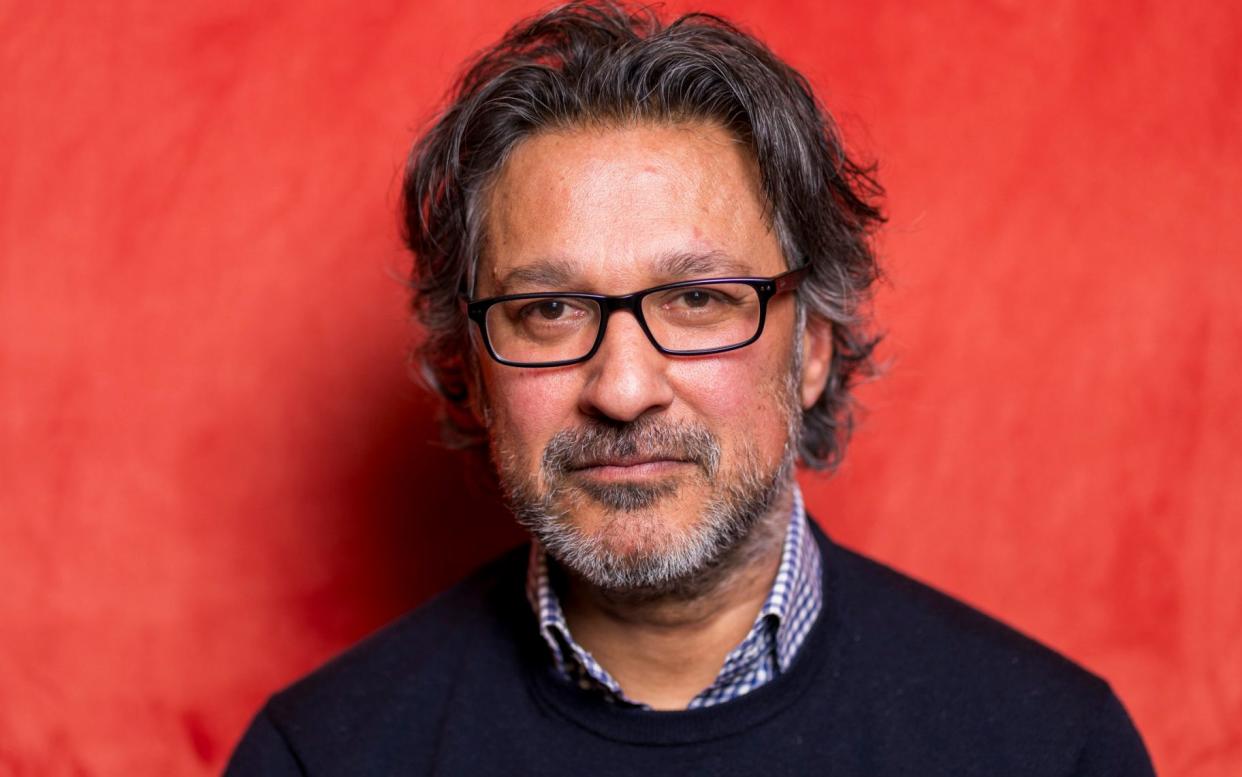
- Oops!Something went wrong.Please try again later.
- Oops!Something went wrong.Please try again later.
- Oops!Something went wrong.Please try again later.
It feels like a particularly appropriate time to be sitting down with Mohit Bakaya, Radio 4’s controller, on the day it is announced that Today programme anchor Martha Kearney is leaving the show. The departure of BBC veteran Kearney, one of the most familiar and loved voices on his station, is adding to a growing sense of unease around not only its flagship morning news show, which has seen a 9 per cent year-on-year drop in numbers tuning in, but also about Radio 4 itself which has been haemorrhaging listeners of late.
There has been a 10 per cent drop overall in the past 12 months on Bakaya’s watch, creating a perception that it has lost its way. And in a sign of the times, and the problems posed by the BBC’s impartiality rules, after our meeting an internal BBC review found another Today presenter, Justin Webb, had broken impartiality rules by sharing his own opinion that trans women are “in other words males” on air in an item last August. The dividing lines and traps of the culture wars are just one of the challenges that the controller is trying to navigate.
“They have gone down,” 59-year-old Bakaya confirms of the listening figures, “which is something we are concerned with.” A graduate of the Beeb’s prestigious training scheme that picks the brightest and best to emerge each year from universities (in his case, in 1993, from Keble College, Oxford where he read PPE), he has worked his way up as a producer and editor on arts programmes on Radios 3 and 4, including launching Front Row in 1998, before his appointment in 2019 as controller of Radio 4 and Radio 4 Extra.
If there is any panic at the loss of listeners, he isn’t showing it. His manner is calm and thoughtful, though far removed from the complacency of which BBC senior management is sometimes accused. The slide in audience figures, he argues, is part of a “general phenomenon” affecting all speech radio.
“There is a bit of news avoidance going on,” he says. “War in the Middle East, the cost of living crisis, climate change, talk about how AI is going to destroy humanity, none is uplifting. So, there can be a rush under duvet moment or a rush to music radio [whose listener numbers are on the up]. Everyone is wrestling with that.”
Happier out of the spotlight, Bakaya rarely gives interviews but has agreed to meet to unveil a brand new daily schedule for Radio 4. If this is his fight-back plan for the station, regular listeners will be relieved to hear that it is more about tweaking than a top-to-bottom shake-up. The word he uses is “replenishment” and that may cause a few more alarm bells. It will, he accepts, impact directly on some of Radio 4’s crown jewels.
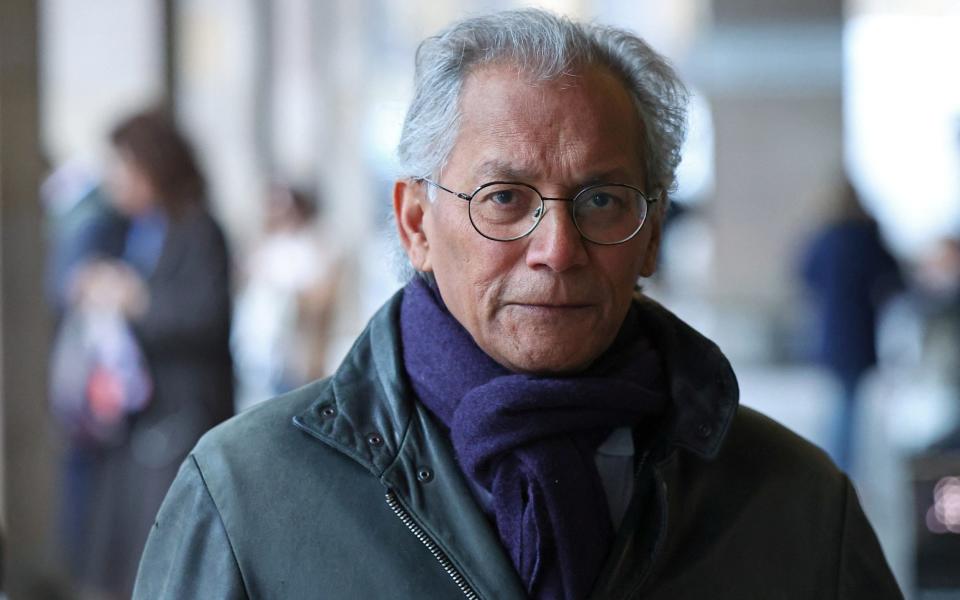
The Archers will get a new, slightly later Sunday slot, Desert Island Discs – DIDs in BBC speak - a longer running time, and there is going to be more prominence for documentaries, more airtime for The Food Programme and The Media Show, but an end to Four Thought and The Listening Project.
Before picking over it in detail, though, there is more to say about the present predicament the station finds itself in. The Today programme, for example, has already been replenished to make it feel cosier, more magazine-like, especially on Saturdays, but with little impact on listener figures.
“I wouldn’t call it cosying,” Bakaya replies, gently chastising. “We have tried to make it friendlier. In the past, the two presenters wouldn’t even acknowledge each other’s existence. To my ears they are now trying to make it easier to navigate, especially if you are coming in for the first time, so you know what is coming up.”
This is, of course, the holy grail, in speech-radio terms: new, younger listeners. “A lot of people are saying, ‘I can get my news from a podcast now. I don’t need to turn on a breakfast show.’ The world is changing fast and we have to recognise those realities.”
Even if it means potentially alienating the audience they already have? “We also have to remember that there are people listening who have been there since the first programme was broadcast. The one thing I say to programme editors all the time is you have to respect your core audience. If you lose that, then you have lost everything.”
Reassuring words, but only if they are translated into action. It is, he confesses, suddenly animated and sitting forward in his chair in his very “old BBC” wood-panelled office high up at the bow of the original Broadcasting House in central London, a balancing act between two imperatives.
The first is “making the daily schedule better serve its audiences’ needs in an age when they have so many alternatives”. And the second is maintaining what he refers to as Radio 4’s “incredible enchanted forest, somewhere you can wander through as a listener and bump into wonderful, strange, exotic beasts that you never thought you would encounter”.
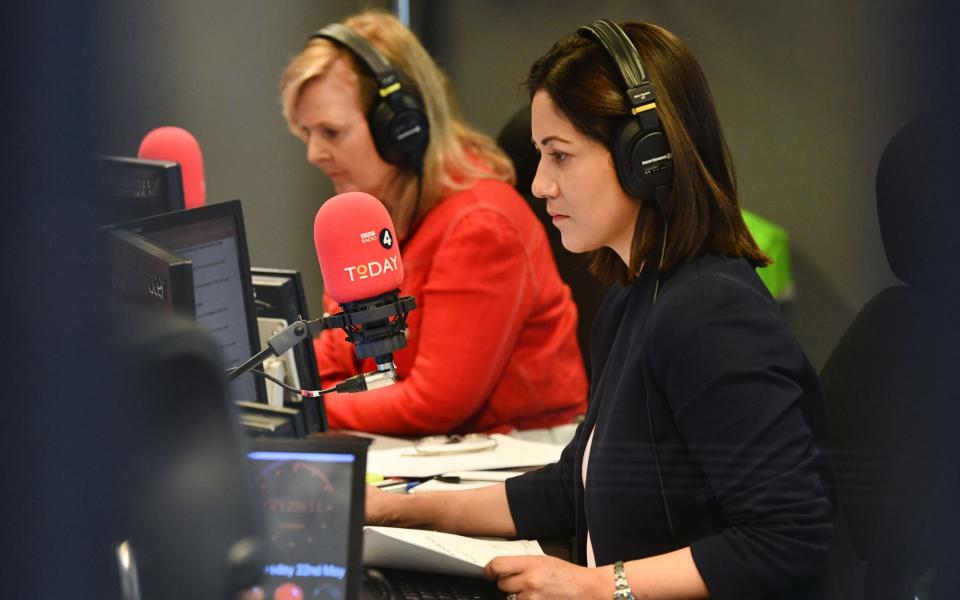
It was the forest that first drew Bakaya into radio at an early age in the family home in south west London where he was born. His father, Madan, had been a production manager in Bollywood who moved to Britain in the early 1960s to promote Hindi films here, while his mother, Uma, was a software developer at IBM, who also gave sitar recitals, exhibited her paintings and made pottery.
She died when he was eight.
“My father brought Indian films to this country, while my mother was an extraordinary polymath. And politics was constantly being talked about in our household. All the genres were there, so it was a little Radio 4 in a funny sort of way.”
By the time he was 10, he recalls with a warm, self-deprecating laugh, he and a school friend were busy recording music from the radio onto old reel-to-reel tapes to make their own versions of programmes where they talked over the songs. They even made up a radio drama based on The Archers and called it The Starchers.
He was, it seems, fated from an early age to end up as controller of Radio 4. “It is my tribe,” he says, likening the station’s relationship with its listeners to football supporters at the team matches he now attends regularly with his seven-year-old son. “Managers come and go, players come and go, everything changes, but the fans’ commitment to the team is undying and the same is true of our Radio 4 audience. They are so dyed in the wool that you’ve got to take them seriously.”
His enthusiasm is unmistakable but how awkward is it, I ask, to hold such a senior post at the BBC at the same time as his half-brother – Samir Shah – is chairman? “I don’t feel his appointment makes anything awkward.”
They have the same mother but different fathers. “We grew up together but he is 13 years older than me,” he says. So by the time Bakaya was taking his first steps into radio with The Starchers, Samir had disappeared off to Hull University.
The chairman, his younger brother explains, “is far removed from the editorial side of things. If he does his job properly, which I am sure he will do, he’s not going to be getting involved in the weeds, though it is odd when we bump into each other in the corridors.”
And since Samir is hugely experienced in broadcasting, he adds, he won’t be able to exert any undue influence. “When I joined the BBC, he was already working in news here. We were always going in different directions.”
That strong family connection with the BBC stretches further. Bakaya’s second wife, Victoria Shepherd, with whom he has a seven-year-old son (who, he reports proudly, has just discovered the joys of Desert Island Discs), was a producer with him on Radio 3’s Night Waves, but now writes books.
He also has a son and a daughter, both in their 20s, with his first wife, Josephine Ryan, an antiques dealer. Being older, their listening habits are more podcast based, he says, but he resists any easy categorisation that presents his linear audience as older and wedded to the daily schedule, while those using the BBC Sounds digital app to access Radio 4 content as young and hard to pin down.
“Linear and digital are symbiotic. If people find us in Sounds for the first time, the chances are they start to like the content and then you can say to them, ‘there is a place called Radio 4, click the switch on and it is all there.’ Sounds allows us to reach out and bring that other audience in.”
But does BBC Sounds – where, in his parallel role as Director of Speech, he also oversees all speech-based content – ultimately pose an existential threat to the linear schedule? Some listeners suspect that resources are being redirected away from Radio 4 and into Sounds, and it is rumoured that Bakaya’s predecessor Gwyneth Williams stood down in 2019 in frustration at this trend.
“I worked closely with Gwyneth and I never heard her say that,” he replies firmly. “When we mention Sounds, it is not because we are trying to drive listeners away from Radio 4. We are telling them you can have your cake and eat it too! You can listen to us when you are at home, but carry on listening on Sounds when you are out.”
Mention of one high-profile departure brings us back round to the other more recent one. It has been widely reported the Woman’s Hour’s 39-year-old Emma Barnett is pencilled in to replace 66-year-old Martha Kearney on Today as part of the drive to woo a younger audience and push the listener figures back up.
“I’m not going to get into speculation. This is Martha’s moment. As she has said, she has been getting up at three in the morning for a long time. And she is doing a new show for us, This Natural Life, and will present Open Country.”
Will her replacement on Today have to be another woman? “I get frustrated by this reductive view of presenters – that it has to be a woman or a brown person. It has to be the best person.”
He does slip in a qualification. “You have to think about the audience experience, and the team has to be representative of the nation. The whole station has to be. People have to feel when they turn on the radio that some aspect of themselves or their identity is somewhere in the schedule.”
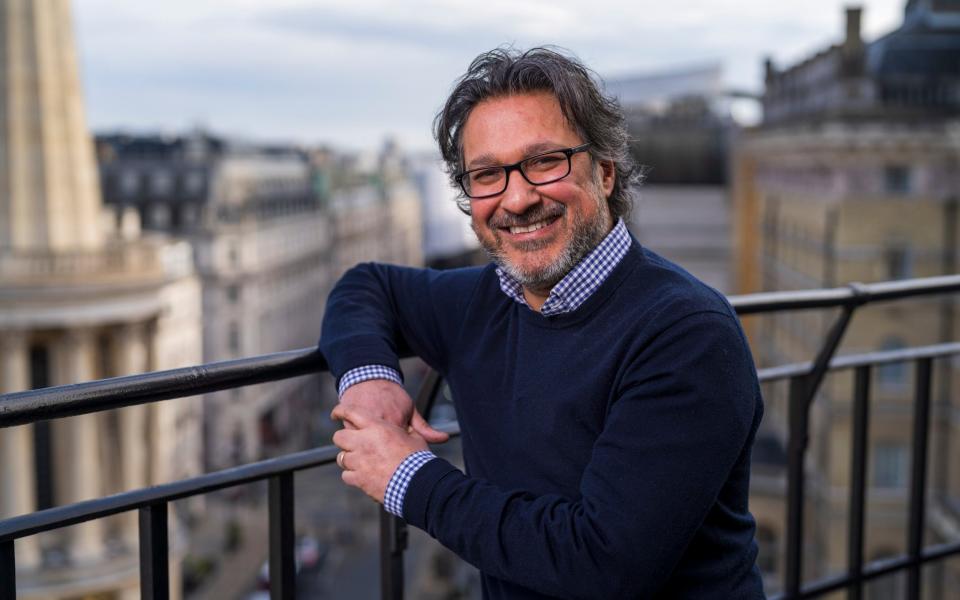
Quite where that happens will be shaped by the new schedule he is sharing with The Telegraph. It will definitely raise some eyebrows, not least among self-professed Archers addicts. The Sunday omnibus edition is being moved on one hour from its peak-time slot at 10 in the morning so as to bring forward Desert Island Discs. It sounds like a promotion for one and a relegation for another.
He shakes his head. “I think if on Sunday mornings you are coming out of Broadcasting House with Paddy O’Connell, and then going into DIDs, it is going to feel like a more natural transition. Often the jump between Broadcasting House and The Archers can feel like a strange one.”
Radio listening patterns, though, show that more people tune in to their radios between 8 and 10 in the morning than later? “But weekends are different,” he corrects me, “because people don’t have to get up for work. If you are making a leisurely Sunday lunch late morning, the change won’t make any difference.”
The Archers team, he assures me, have told him precisely that. And the pill has been sugared by him finding time on Saturdays to repeat the Friday evening episode, something not currently available.
His decision to promote Desert Island Discs has a clearer logic if you go by listening figures. “The figures for DIDs have grown really fast,” he enthuses, “partly to do with BBC Sounds and podcasts, and partly to do with the quality of guests, [the mix that includes] people you’ve never heard of with interesting stories.”
But why give it an extra 15 minutes running time (it’s being extended to one hour)? There are plenty of Radio 4 listeners who compare Lauren Laverne, presenter since 2018, unfavourably with her predecessors Kirsty Young and Sue Lawley. In a much-commented-upon 2019 article, The Spectator’s Melanie McDonagh argued that Laverne’s appointment was one of the worst that Radio 4 has made “in its apparent effort to alienate its listeners”.
Bakaya vigorously disagrees. “I am sure there are people who don’t like her but I think Lauren has really settled into the role. She gives space for people. The best interviewers are the ones who know when to sit back and let people open up.”
The accusation most often made against Laverne is that she is not sufficiently curious and doesn’t come back with the follow-up question to a guest’s remarks that would dig just a little deeper. “Let me let you into something here,” Bakaya confides. “They record an awful lot of time and often what happens is those follow-up questions [are edited] out because they have to hit the eight records.”
The extra 15 minutes will give her more space to reveal this so far unheard skill. “We are not going to play more music,” he promises. “It is about getting more out of the guests. So, I am hopeful.”
Such positivity will help in some of the wider challenges he faces at the helm of Radio 4. As the Justin Webb case this week demonstrated, it sits uneasily on the front-line of what can and can’t be said and is often accused – by this paper’s readers among others – of having become too woke. “You have to take that seriously,” says Bakaya.
“You shouldn’t dismiss people’s concerns. We mustn’t make assumptions about what right-minded people think.”
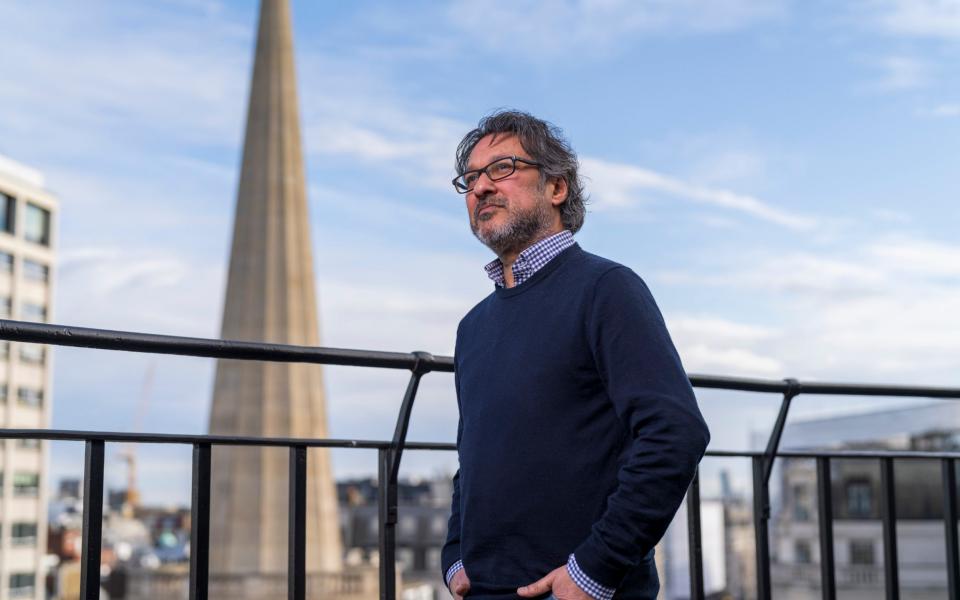
That is a message he constantly instils in the station’s editorial teams. “I am keen to hear the whole of the UK, with all the various views and beliefs, in all our content – comedy, drama as well as factual programmes.”
Does that make Radio 4 woke? “There are times when people listen and say that. The truth is that Radio 4 is a mirror. As Britain changes, you are going to bump into change in Britain on Radio 4. If you don’t want change in Britain, or you live in a part of Britain where you don’t see that, Radio 4 can be a rude awakening.”
In a column in The Telegraph last year, Ben Lawrence, the paper’s Arts Editor, laid another, related charge against Radio 4, that in its rush to attract new, younger listeners, it had “abandoned” Baby Boomers for whom the station is “a familiar and reassuring presence”.
“Well,” he answers with a broad smile, “if you count Baby Boomers as those born between 1945 and 1964, then I am one.” And he insists that his generation “are the solid core of our audience and incredibly important”.
And, he might add, vital to hold on to, since there is an increasing array of other options for them, with Times Radio’s regular audience of half a million roughly equal to the numbers Today has lost in the past year. Meanwhile, LBC has attracted several disgruntled BBC favourites, including Andrew Marr and Emily Maitlis, and now has a national audience of 2.5 million. Even GB News offers a radio strand alongside its television channel.
Is there a threat to Radio 4’s survival? “We have a culture where people are straying towards [outlets] that give them the opinions that reflect their own opinion. That for me is an alarming trend.”
Radio 4, he believes, continues to have an important role to play in standing firm against this drift that sees other broadcasters taking a more relaxed approach to impartiality rules. “I believe profoundly that Radio 4’s job is to help, that it has a civic responsibility to say to people, ‘here is the information you need to the ballot box so you can feel properly informed’. And that is not by telling them all the things they already believe, but also by giving them stuff they don’t agree with, and the context.”
That for him is why the impartiality rules at the BBC are so precious. “Overall in broadcasting we are seeing people monetise the echo chamber and division, and that is dangerous. If Radio 4 didn’t exist, you’d have to invent it.”

